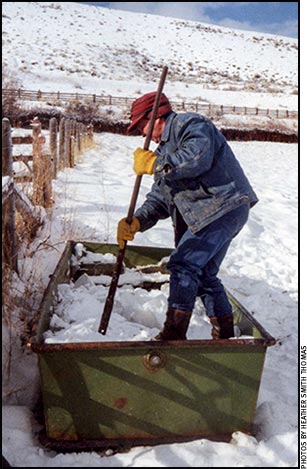Cattle may not drink enough in cold weather, and if they aren’t drinking enough, they don’t eat enough and subsequently suffer more cold stress.
When weather gets cold, cattle grow a longer, thicker hair coat. This, and a layer of fat under the hide, provides insulation to reduce heat loss and minimize cold stress. Dropping temperatures in the fall and shorter days with longer nights stimulate appetite, growth of winter hair and other physiological changes.
Body metabolism increases. Feed intake increases and passage of feed through the digestive tract speeds up as cattle need more “fuel” to keep warm. Feed requirements may go up as much as 10% to 25%. All of these changes contribute to an increase in heat production so the animal can withstand winter temperatures.
To process the additional feed, the digestive tract needs adequate fluid. Cattle must drink enough water to handle the demands of ruminant digestion and increased metabolism, and to prevent dehydration and impaction. It is important to provide adequate water for livestock during cold weather.

Terry Mader, Mader Consulting, Gretna, Neb., professor emeritus, University of Nebraska–Lincoln, has done research on heat stress and cold stress in cattle. Winter water can be a challenge where temperatures get well below freezing or water supplies are diminished due to lack of rainfall.
Terry Mader, Mader Consulting, Gretna, Neb., professor emeritus, University of Nebraska–Lincoln, has done research on heat stress and cold stress in cattle. Winter water can be a challenge where temperatures get well below freezing or water supplies are diminished due to lack of rainfall.
“We don’t always get the ice broken or have sufficient open water. In cold or wet conditions, if cattle are in a sheltered area where they can get out of the wind, they don’t always leave those areas to go to water. Sometimes they may only go to water every second or third day,” says Mader.
“The ruminant has a large storage reservoir to draw on, but it’s not ideal to go that long without water, and it’s difficult to maintain normal metabolic function if they have to continually draw on that reservoir and deplete tissue stores,” he says.
“Our work with heat stress shows that even in hot weather, cattle don’t want to drink really cold water. They prefer water about 60° to 70°. In winter, it is usually colder than that. If water is close to freezing, some cattle may not drink enough.”
In really cold conditions, these animals are experiencing stress and don’t always have a sense of thirst because there are overriding factors. The animal’s priority is to deal with the stress and survive.
“There is also a tendency to urinate more with some stresses, such as shipping, handling, moving or severe cold stress, so several things may contribute to depleting the body’s water reserves. Water requirement increases when the animals are experiencing these levels of stress.”
In cold weather, cattle have to eat more to generate more body heat and need more water for proper gut function.
There is a definite relationship between feed intake and water intake unless they are consuming a high-moisture feed, says Mader. However, in severely cold weather it would be difficult for cattle to eat a high-moisture feed because it would freeze. All of these factors complicate management of cattle in cold weather.
“I’ve seen cattle on dry feed, with inadequate water, become almost impacted with very firm manure. Microbes in the rumen need a fluid environment to function best,” he says.
The rumen microbes need adequate protein and adequate moisture for optimum fermentation.
“Water is necessary for the rumination process and adequate mixing. Water is also important to maintain good electrolyte balances. Every process in the body is driven by the ability to move nutrients across cell walls. Good cellular health, gut function, nutrient utilization and normal metabolic function, and keeping the body at proper temperature all depend on adequate supplies of water,” Mader says.
Source: American Angus Association Beef Bulletin Extra
Editor’s Note: Heather Smith Thomas is a freelance writer and a cattlewoman from Salmon, Idaho.



Leave A Comment